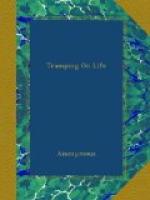Then I began to read—Manfred, Marino Faliero, Sardanapalus—the Deformed Transformed ... The Bride of Abydos, The Corsair, Lara, The Prisoner of Chillon_.
The frontispiece to the book was a portrait of Byron with flowing tie and open shirt. Much as a devout Catholic wears a gold cross around his neck to signify his belief, with a like devoutness I took to wearing my shirt open at the neck, and a loose, flowing black tie. And I ruffled my hair in the Byronic style.
“I see you’re discovering Byron,” my father laughed.
Then he slyly intimated that the best of the poet’s works I had evidently overlooked, Childe Harold and Don Juan. And he quoted me the passage about the lifted skirt above the peeking ankle. And he reinforced his observation by grinning salaciously.
From that time on I searched with all the fever of adolescence through Byron for every passage which bore on sex, the mystery of which was beginning to devour my days.
I read and pondered, shaking with eagerness, the stories of Haidee, of Antonia and Julia—the tale of the dream of Dudu. I dwelt in a musk-scented room of imagination. Silver fountains played about me. Light forms flowed and undulated in white draperies over mosaiced pavements ... flashing dark eyes shone mysteriously and amorously, starry through curtains and veils.
My every thought was alert with naive, speculative curiosity concerning the mystery of woman.
Through Byron I learned about Moore. I procured the latter’s Lalla Rookh, his odes of Anacreon.
From Byron and Moore I built up an adolescent ideal of woman,—exquisitely sensual and sexual, and yet an angel, superior to men: an ideal of a fellow creature who was both a living, breathing mystery and a walking sweetmeat ... a white creation moved and actuated by instinct and intuition—a perpetually inexplicable ecstasy and madness to man.
I drew more and more apart to myself. Always looked upon as queer by the good, bourgeois families that surrounded us, I was now considered madder still.
* * * * *
How wonderful it would be to become a hermit on some far mountain side, wearing a grey robe, clear-browed and calmly speculative under the stars—or, maybe,—more wonderful: a singer for men, a travelling minstrel—in each case, whether minstrel or hermit, whether teaching great doctrines or singing great songs for all the world—to have come to me, as a pilgrim seeking enlightenment, the most beautiful maiden in the world, one who was innocent of what man meant. And together we would learn the mystery of life, and live in mutual purity and innocence.
* * * * *
The strangeness of my physical person lured me. I marvelled at, scrutinised intimately the wonder of myself. I was insatiable in my curiosities.
* * * * *




